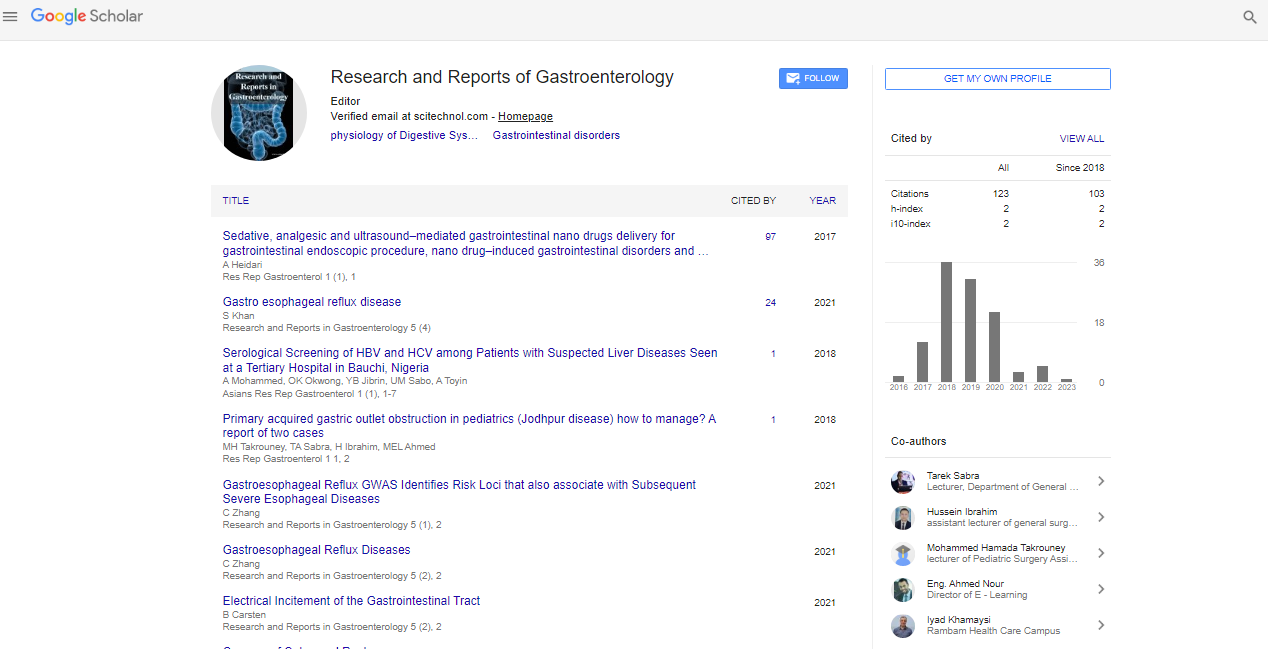Commentary, Res Rep Gastroenterol Vol: 7 Issue: 2
An Overview on Effect of Dietary Factors on Gastrointestinal Health and Nutrition
Johnson Howell*
1Department of Gastroenterology, MedStar Georgetown University Hospital, Washington, USA
*Corresponding Author: Johnson Howell,
Department of Gastroenterology,
MedStar Georgetown University Hospital, Washington, USA
E-mail: howelljohnson@gmail.com
Received date: 15 May, 2023, Manuscript No RRG-23-106614;
Editor assigned date: 17 May, 2023, PreQC No RRG-23-106614(PQ);
Reviewed date: 01 June, 2023, QC No RRG-23-106614;
Revised date: 08 June, 2023, Manuscript No RRG-23-106614 (R);
Published date: 16 June, 2023, DOI: 10.4172/Rrg.1000140
Citation: Howell J (2023) An Overview on Effect of Dietary Factors on Gastrointestinal Health and Nutrition. Res Rep Gastroenterol 7:2.
Abstract
Description
The human gut is habitat to a wide variety and abundance of microorganisms, which interact with the host and the environment to produce a complex ecological system. These studies have shown a significant amount of variety and variability in the human gut microbiome. A long-term diet seems to have the most impact on gut flora so far out of all external influences. The gut microbiome can alter significantly with food, according to recent studies on the impacts of dietary interventions; nevertheless, the gut microbiota is often resilient, and short-term dietary treatments are largely unsuccessful in treating obesity and malnutrition.
Fiber and prebiotics
Dietary fiber and prebiotics are essential components of a healthy diet that positively influence the gut microbiota. Fiber serves as a substrate for beneficial bacteria, promoting their growth and activity. Prebiotics, including inulin, oligofructose, and fructooligosaccharides, selectively stimulate the growth and activity of specific beneficial bacteria. Both fiber and prebiotics have been shown to increase the abundance of beneficial bacteria also enhancing microbial diversity in the gut. These changes contribute to improved gut barrier function, reduced inflammation, and overall gastrointestinal health.
Probiotics
Probiotics are live beneficial bacteria that, when consumed in adequate amounts, confer health benefits. They can be obtained from fermented foods or through supplementation. Probiotics have been shown to modulate the gut microbiota composition and function, promoting a healthy microbial balance. They enhance gut barrier function, produce antimicrobial substances, and modulate immune responses, thereby reducing the risk of gastrointestinal disorders such as Inflammatory Bowel Disease (IBD), Irritable Bowel Syndrome (IBS), and infectious diarrhea.
Polyphenols
Polyphenols are plant-derived compounds found in various fruits, vegetables, and beverages like tea and coffee. They possess antioxidant and anti-inflammatory properties and can influence the gut microbiota composition. Polyphenols are metabolized by the gut microbiota into bioactive compounds that exert beneficial effects on gastrointestinal health. They promote the growth of beneficial bacteria, inhibit the growth of harmful bacteria, and modulate microbial metabolism. Consumption of polyphenol-rich foods has been associated with a reduced risk of gastrointestinal disorders, including colorectal cancer and IBD.
Fatty Acids
Dietary fatty acids, particularly omega-3 fatty acids found in fatty fish, flaxseeds, and walnuts, have been linked to gastrointestinal health. Omega-3 fatty acids exhibit anti-inflammatory properties and influence the gut microbiota composition. They can increase the abundance of beneficial bacteria while reducing the levels of proinflammatory bacteria. Omega-3 fatty acids have been shown to alleviate symptoms in IBD, improve gut barrier function, and contribute to overall gastrointestinal well-being.
Processed and high-fat diets
Consumption of processed and high-fat diets has been associated with adverse effects on the gut microbiota and gastrointestinal health. These diets are typically low in fiber and rich in saturated fats, which can lead to dysbiosis and a decrease in beneficial bacteria. Processed foods may also contain additives and preservatives that can disrupt the gut microbiota balance. High-fat diets have been linked to increased intestinal permeability, chronic inflammation, and an increased risk of developing gastrointestinal disorders, including colorectal cancer and IBD.
Conclusion
Diet plays a crucial role in shaping the gut microbiota and influencing gastrointestinal health. Consuming a diet rich in fiber, prebiotics, probiotics, polyphenols, and omega-3 fatty acids promotes a diverse and beneficial gut microbiota composition, leading to enhanced gut barrier function, reduced inflammation, and improved gastrointestinal health. Conversely, diets high in processed foods and saturated fats can disrupt the gut microbiota balance, increase intestinal permeability, and contribute to the development of gastrointestinal disorders. By adopting a balanced and nutrient-rich diet, individuals can positively influence their gut microbiota and promote optimal gastrointestinal health. Further research is needed to elucidate the specific mechanisms by which dietary factors impact the gut microbiota and their potential therapeutic applications in gastrointestinal disorders.
 Spanish
Spanish  Chinese
Chinese  Russian
Russian  German
German  French
French  Japanese
Japanese  Portuguese
Portuguese  Hindi
Hindi 